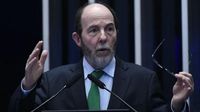Economist Armínio Fraga has stirred controversy by suggesting that Brazil should freeze the minimum wage "in real terms" for six years. This proposal was made during the Brazil Conference held at Harvard University and the Massachusetts Institute of Technology (MIT) on April 12, 2025. Fraga, who served as the president of the Central Bank from 1999 to 2003, emphasized the need for fiscal austerity and a reevaluation of public spending priorities, particularly in relation to social security.
Fraga's suggestion to freeze the minimum wage means that it would not increase above inflation for six years, which he argues is necessary to address the country's growing fiscal challenges. Currently, the existing rule allows for a real increase of up to 2.5%. He stated, "A giant account is social security. It needs a big reform. A good and easier one would be to freeze the minimum wage for six years." This approach, he believes, would help stabilize the country's finances, which he described as being in a precarious state.
During his talk, Fraga pointed out that public spending in Brazil is heavily skewed, with 80% of the budget allocated to payroll and social security expenses. He argued that this figure should ideally be reduced to about 60%. "The priorities of public spending in Brazil are completely wrong," he claimed, suggesting that a reevaluation is necessary to foster economic growth and sustainability.
Fraga's proposal has drawn sharp criticism, particularly from opposition politicians. Federal Deputy Ivan Valente from the PSOL party condemned the idea, stating, "The minimum wage should not be frozen for six years. These bankers only want one thing: for the poor to remain eternally poor!" This backlash highlights the tension between fiscal responsibility and social equity, with critics arguing that freezing wages would disproportionately impact the most vulnerable populations.
Furthermore, Fraga's comments reflect a broader critique of Brazil's economic policies and the need for significant reforms. He described Brazil as a "patient in the ICU," indicating that urgent measures are required to rectify its financial situation. He advocated for reducing tax expenditures by 2% of GDP, which he believes could save approximately 3% of GDP in public spending.
Fraga's remarks come at a time when Brazil is grappling with a high level of public debt and economic instability. The public sector reportedly spent R$ 910.9 billion on financial expenses in the year leading up to February 2025, with an annualized nominal deficit reaching R$ 939.8 billion. Such figures underscore the pressing need for a comprehensive strategy to manage public finances effectively.
Beyond domestic issues, Fraga also expressed concern about international relations, particularly regarding the U.S. under President Donald Trump. He remarked, "When I see Trump mistreating and humiliating Canada and Mexico, I get a bit scared. Where are we going this way?" His comments suggest a desire for Brazil to maintain a degree of independence in its foreign policy, especially in the face of shifting global dynamics.
Fraga's proposals and critiques of current policies have sparked a heated debate about the future direction of Brazil's economy. While some view his recommendations as necessary steps towards fiscal responsibility, others argue that they risk exacerbating inequality and social injustice.
As the Brazil Conference concluded, it became clear that the discussions surrounding Fraga's proposals would continue to resonate in the political landscape. The tension between economic reforms and the protection of social welfare remains a critical issue for lawmakers and citizens alike, as Brazil navigates its path forward in a complex global environment.
In summary, Armínio Fraga's call to freeze the minimum wage for six years has ignited significant debate regarding fiscal policy and social equity in Brazil. His views reflect a broader concern about the country's economic health and the urgent need for reform, but they also highlight the potential social ramifications of such measures. As Brazil continues to grapple with these challenges, the dialogue around Fraga's proposals will likely remain a focal point in the nation's ongoing economic discourse.







